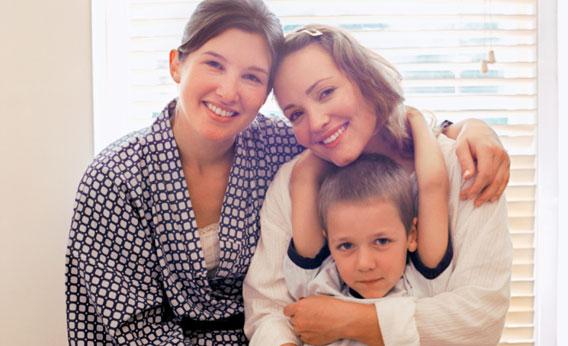Last week, Slate published an article by Mark Regnerus about his study of parents who had same-sex romantic relationships. According to Regnerus, the study shows different (and generally worse) outcomes for children whose parents engaged in such relationships, compared to adults who lived with their married, biological parents throughout childhood. Slate also published a critique of the study—and a defense of the data—by William Saletan.
Both writers had more to say, and they agreed to continue the exchange here. What follows is a dialogue, beginning with Regnerus’ response to Saletan’s articles about the study.
Hi Will,
Slate may be a strange venue for a public “peer review” process, but I am willing. The New Family Structures Study (NFSS) was not conceived of in the dark, nor do I have anything to hide. The data are high quality, and yes, a good investment. It’s information, albeit sensitive stuff. At the beginning of the project, I committed to pulling together a group of consultants from left and right, and I did that. Indeed, at the outset I invited several of the authors of important earlier studies on the children of same-sex households, as well as a demographer from the Williams Institute, to be a part of the genesis of the research and survey design process, but they declined. Other quality family scholars—all of whom lean left—took their place. Don’t you think if this were a right-wing conspiracy, it would be headed by someone who’s more savvy, political, one-sided, and predictable than I am? There is no conspiracy here, just a piece of contested social science from a study funded by a pair of organizations many of your readers distrust. Critics are disputing the meaning of the study—a meaning I have not assigned to it—as well as the very nerve to have conducted it in the first place. But I’m glad you’ve seen value in it.
So a good deal of early ire hinges on my construction of LMs, which refers to “lesbian mother,” an acronym I state is not about sexual orientation, but rather about relationship behavior (i.e. the mother has had a same-sex relationship). So why did I group together LMs who raised kids in a coupled relationship with those who may have only been in shorter-term same-sex relationships? Remember, we started with 15,058 random contacts. We had only two cases in which mom and her partner were together for 18 years. We’ve got only six cases where mom and her partner were reported to have stayed together for 10 or more years, and 18 cases for five years. We’re still seriously in small-sample-size territory, prone to making what’s called a Type II error, meaning we could erroneously conclude that there are no differences when there really are. How about those 81 cases wherein respondents reported living with mom and her partner for at least a good share of a year or more? While hardly an ideal sample size, the story there changes little from that which appeared in the study (in which my analytic sample size was 163, and included LMs who lived with their mother and her partner and LMs who did not): 20 out of 40 outcomes reveal simple statistically-significant differences with the “intact bio family,” and 18 after controls. This dip from 24 statistically-significant differences after controls (the number in the study) to 18 differences here appears largely a result of declining statistical power, not genuinely disappearing distinctions.
In fact, the two LM groups (those raising kids while living with their partner in the home, and those raising kids with a relationship partner who didn’t live with them) look pretty similar to each other on most counts. Those young adults who reported LM-and-partner togetherness also reported greater current unemployment, public assistance, and expressed greater insecurity about their family of origin, though they appear to report slightly less depression than those respondents whose parent’s same-sex relationship was never “residential.”
But to be fairer, let’s compare these 81 respondents with the adult children of heterosexual stepfamilies and single parents. The story here too remains as it did in the published study: still a variety of differences. Those 81 children of LMs exhibited statistically-significant differences from the children of hetero stepfamilies and single parents 18 percent of the time. Again, comparable to the story in the published study, yet with an obvious decline in sample size and hence a decline in the study’s ability to detect real differences that may (or may not) exist. So, yes, if you were raised by LMs in the time period measured, there are differences, and that was the only research question I ever pursued.
If I could have, I would have compared stably-coupled LMs and GFs (gay fathers) with everyone else. As I noted earlier, the longer the household stay of the two-LMs, the better the kids’ outcomes appear at face value, but a meaningful statistical comparison of those few is just not possible. Some feel it was unethical to have moved forward once I realized this. That’s extreme, a standard to which research prior to this study has not been held. I thought the information we could learn deserved a hearing.
Mark
